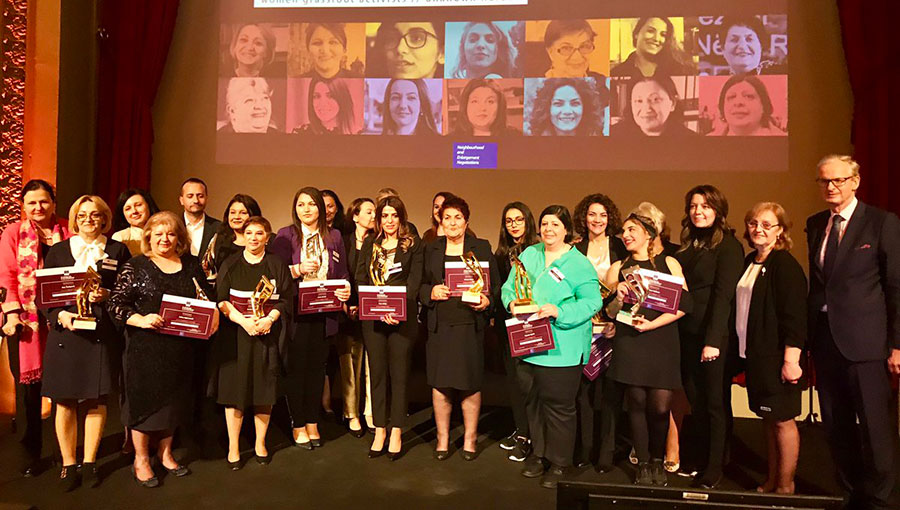The European Commission announced the winners of the Third EU Award for Roma Integration for the Western Balkans and Turkey in an official ceremony. Launched in 2014, the award aims at highlighting the political importance of Roma integration in the EU enlargement process, to enhance the role of key players, and to show the EU’s determination and commitment to enhance social inclusion of Roma people.
The full list and biographies of the awardees you can find here, and among them there are two activists from Serbia.
Ana Šaćipović
Ana is the Director of the Association of Roma Women “Osvit” based in Niš. The association focuses on raising awareness among Roma women, and within the entire Roma community, about the importance of their involvement in social, economic, educational and cultural life. “Osvit” also aims to prevent and combat violence in Roma families by empowering women to break the cycle of violence and to influence the public and decision-makers to create a non-discriminatory society.
In 2005, she set up the first SOS hotline in Romani and Serbian languages for Roma women and children who became victims of violence. This important initiative is accompanied by educational workshops and street actions to promote the recognition and prevention of violence in partnership relations. The association also monitors the work of local institutions and issues recommendations on public policies contributing to the improvement of the situation of women and Roma women.
Ana is also the author of the programme “Support for the improvement of the position of Roma women”, which contributes to better quality of services provided by the local institutions to Roma women in order to exercise their rights.
“A long road still lies ahead of us. It is a process when you are changing the awareness of a Balkans nation, saying that the woman’s place is to be equal with the man. That the Roma women belong there with other women regardless of their ethnicity, level of education, social status. Our laws vouch equal rights for everybody,” she said.
 Slavica Vasić
Slavica Vasić
Slavica is an activist and a co-founder of Roma Women’s Centre “BIBIJA” established in Belgrade in 1998. The mission of the centre is to strengthen the position of Roma women in the society and the visibility of Roma women’s rights, including the right to education, to a free choice of partner, to employment and to adequate health care services. “BIBIJA” is also committed to addressing the issue of violence against Roma women and of early marriages in the Roma community.
Slavica has been particularly involved in the social integration of women from multi-marginalised groups. She has contributed to raising the visibility of marginalised Roma women in the labour market, but also to drawing public attention to the prejudices and stereotypes against Roma women and other marginalised groups. She has been particularly committed to helping girls in pursuing their education.
She also participated in the development of several strategic documents related to gender equality and to the social inclusion of Roma men and women. She continues to monitor public policy in those sectors.
“My true award are the girls, the young women who managed to make a change in their lives. I can already see changes in some of the younger girls; the most important thing for Roma women or girls is education. We want to cut down the number of early marriages, we want Roma girls to be educated, we want them to be like all other women in Serbia,” she claims.
Hahn: EU honours the drivers of change
Johannes Hahn, EU Commissioner for European Neighbourhood Policy and Enlargement Negotiations says the award is promoting an inclusive society.
“Through this year’s award, the EU honours Roma women activists, drivers of change, whose commitment contributes to promoting a more inclusive society. Advancing women’s leadership and economic empowerment is an absolute priority for the European Union. We are promoting gender equality and women’s empowerment in all aspects of our policies both inside and outside the EU as this is for the benefit of all.”
Of the estimated 10-12 million Roma living in Europe, about 1 million live in the Western Balkans and about 2.8 million live in Turkey. The Roma share a rich culture and history, which is inextricably linked to Europe, but they have also faced a long history of poverty and exclusion. Although being equal citizens, too many are still victims of racism, discrimination, social exclusion and live in deep poverty. Improving the inclusion of Roma people therefore continues to be a key priority for the EU and effective integration became one of the conditions that enlargement countries have to fulfil in order to become a Member State.
The award ceremony took place in the framework of the Fourth EU Roma Week (18 – 21 March 2019).




